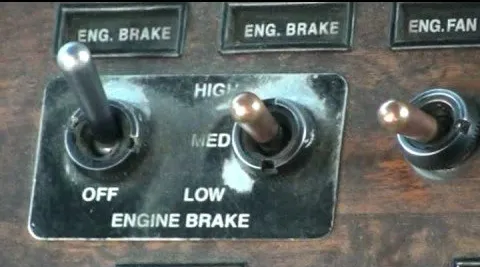 Virtually all city and municipalities have laws regarding the use of a jake brake in residential areas. However, as usual, there is very little enforcement being done.
Virtually all city and municipalities have laws regarding the use of a jake brake in residential areas. However, as usual, there is very little enforcement being done.
Truck drivers either drive too fast or they've grown accustomed to use of jake brakes with no regard for anyone but themselves. I hear and see this happening all the time in residential arterial routes.
As a civilian what are our options and how effective are they trying to report these drivers?
Engine or Jake Brake

The device that you are talking about is properly called an Engine Brake. It uses engine compression to slow the vehicle so that the driver can either supplement the brakes or not use the brakes. Unfortunately, as you are all aware, it tends to create a lot of noise.
Related Discussion on This Site
Articles on this blog that are related to noise from vehicles. There are various discussions of how too much noise may be determined.
Ministry of Transportation and Infrastructure
In addition, here's an article from Tran BC titled "The Sound and Fury: Engine Brake Noise and How to Stop it."
Prohibition of Excessive Noise
Police may choose to take action via the Motor Vehicle Act Regulations:
Prohibition
7A.01 No person shall start, drive, turn or stop any motor vehicle, or accelerate the vehicle engine while the vehicle is stationary, in a manner which causes any loud and unnecessary noise in or from the engine, exhaust system or the braking system, or from the contact of the tires with the roadway.
Municipal Bylaws
Otherwise, a municipality may have created a bylaw forbidding the use of engine brakes within the municipality or areas of it posted by sign. I will leave it up to you to search out your traffic bylaw and read what it says yourself.
CVSE
These incidents may be reported to Commercial Vehicle Safety and Enforcement at 1-888-775-8785 instead of the police.
Learn More
Share This Article
If this is relating to noise...
I think you are confusing what air brakes are. They're the "regular" brakes equipped on larger trucks. Just like the hydraulic brakes in a passenger vehicle, they are the primary means of deceleration; air brakes use Air pumped into reservoirs directly from the atmosphere, while hydraulic brakes use Braking Liquid (mineral oil) pumped in at a service station.
The loudest noise from Air brakes is a "whoooosh" you can hear when excess air or moisture is vented from the reservoirs. Operational noise (when pressing the main brake pedal) is lower than the sound of the engines or the tires.
What you may be referring to noise-wise are the "Engine brakes". Thats when instead of pressing the main brake pedal, the driver shifts down a gear and releases the clutch. That makes a horrid "Broom-poom-poom-parram" sound because air is sucked into the engine from the intake, exhaust and whichever broken seal on the engine.
Engine brakes are restricted in residential neighbourhoods, and you should get the number plates of the offenders, and report to CVSE, Truck owner company and lodge a noise complaint with your local Police if you are not getting anywhere.
- Log in to post comments
Most commercial vehicles greater than 5 tons are generally equipped with air brakes, engine brakes or an exhaust brake. There seems to be confusion over what is what, so I hope to clear up this confusion.
Your car, van or pick-up is equipped with hydraulic brakes where special "non compressible oil"** ( **aka Brake Fluid ) is used to activate the actual brake shoes or pads at each wheel when you press on the brake peddle.
Commercial Trucks use compressed air stored in tanks as the medium to activate the brake shoes or pads on the wheels when the peddle is pressed. There is very little noise from the brakes when they are pressed because the system is a sealed circuit, but when the driver releases the brake peddle there is a "whoosh" sound that occurs when the peddle is released. This is the sound of the air used to "apply the brakes", being released harmlessly into the atmosphere. It's not that annoying and won't disturb the average Jane or Joe public...
Engine Brakes are another animal all together. This system is used on large diesel engines to assist in slowing the vehicle down to save on the air brake "air supply". What happens is the driver removes his or her foot from the accelerator pedal and the engine switches from being an engine into being a very large, high compression, "compressor". The engine brake changes the valve events inside the engine to hold back the compression stroke of the engine to just about top dead center of the piston run then just before the normal "ignition stage" the exhaust valve opens and releases the compressed air from the cylinder to the atmosphere. The release of air is what causes the annoying "Burrr" sound that decreases in volume as the engine slows down, then increases in volume when a next lower gear is selected by the driver... This is repeated until the vehicle is at a low enough speed where the engine brake is not needed and normal traveling speed is resumed by applying pressure to the accelerator pedal. This is the culprit that most residents can't handle listening to in the evening hours and early morning hours...
Exhaust Brakes are a different system again, but the principle is to supplement the braking system by conserving the "air supply" and slowing the vehicle down by suppressing the exhaust flow out of the exhaust system. Activated again by removing the foot from the accelerator pedal the exhaust brake shuts a damper in the exhaust pipe causing the exhaust gasses to build up and slow the vehicle down. This system also makes a similar racket like and engine brake, but not as harsh on the ears..
Now it should be noted that some over done diesel pickup trucks can be equipped with exhaust brakes and modified exhaust systems. This is a case of "little boy syndrome" and they want to be an actual real truck driver, but with no real commitment to going through the motions of getting a class one license. These jokers will roar around with the modified exhaust and trigger the exhaust brakes in an attempt to seem "cool"... Please feel free to catch these guys on video and forward same to your local police. Those actions are a direct violation of the motor vehicle act...
Engine and Exhaust Brakes are to be used on the highway only and then only as a supplement to the normal braking system. Abuse of these systems can come with bylaw fines for misuse. A real professional driver will control the vehicle speed using the normal air brakes and would only use the Engine Brake or Exhaust Brake as an emergency measure in city limits...
Hope that helps clear up which is which
- Log in to post comments
Another component of the air system not mentioned, is the air dryer, and it’s contribution to noise pollution.
The air dryer, is exactly that, and is activated at peak system pressure. (Usually around 120 PSI) compressed air travels through a container of desiccant, and at the end of the cycle, is triggered to expell the collected moisture in the dryer. It is noisy, and can be startling, but I’m pretty sure it is not what you guys are talking about.
- Log in to post comments
My mistake...yes, engine brakes. everyone i know (non truckers of course) calls them air brakes but the swoosh sound they make is kinda cool.
What is CVSE?
What is by definition of "residential neighbourhoods?"
Is Cambie street or SE Marine Drive in Vancouver residential?
Or is the use of engine brakes forbidden within the side streets in residential neighbourhoods?
As far as reporting the truck, without looking at the front plate I think it is next to impossible to pin-point the driver if it is a cartage company or fleet truck?
- Log in to post comments
Cambie and SE Marine Drive... would hardly qualify as residential. Those are what's called arterial roads.
CVSE is the Commercial Vehicle Safety Enforcement, but they enforce all laws regarding trucks/commercial vehicles, not only safety specific. CVSE officers can even enforce MVA - and pull people over for speeding, its not their job, but the peace officer oath may require them to take action if they see something outrageous.
Use of engine brakes is for sure forbidden where it is explicitly posted, I'm not sure if there are specific brake use requirements based on street type, but there are for sure regulations that ban trucks from certain streets. Signs are under authority of the Minister of Transportation (Mr. Todd Stone), you could write to him to request an engine-brake-sign in your area.
Unfortunately to report someone you have to identify them well, it includes the vehicle description and number plates, as well as any other discernible markings, and on top of that you have to get a real good look at the driver, so you could identify them to the company if reporting directly.
If you report trucks making noise on Cambie or Marine Drive to the trucking company, consider them polite if they don't burst out laughing right on the phone.
I doubt that there is any real recourse for you in this case, except for moving :(
- Log in to post comments
The explanation for air brakes is correct.
However, you missed completely for engine brakes. Engine brakes do make that very well described sound, but they have nothing to do with shifting gears. Engine brakes are a compression release on each cylinder of the engine. When in use, the engine valves are opened, preventing that cylinder from firing. The lack of compression (firing) slows the engine which in turn slows the vehicle. If the engine brake is turned on (it is a selective operation), it actuates as soon as the accelerator pedal is released.
- Log in to post comments
I'm not a trucker and never drove anything over two axels,
so I thank you for the explanation.
I think my "theory" is still correct for "Engine brake" of a typical passenger vehicle.
But I did not know that tractor trailer type vehicles had an actual engine brake mode.
- Log in to post comments
Engine brake restrictions are generally completed through signage via the applicable municipality for municipal roads or the Ministry of Transportation if on a Highway. Having said that there may be municipal bylaws in place for engine brake restrictions outside of signage.I would recommend discussing your concerns with the City of Vancouver in regards to what municipal bylaw rules might be in place. Municipal bylaws are not something that CVSE is authorized to enforce.
- Log in to post comments
My home backs on to a fairly busy arterial street. It is used extensively by truckers going into and out of an industrial area 24 hours a day. The street has a slight incline but is not a steep hill. Despite the warning signs many truckers still use their engine brakes when going down the hill. Numerous residents on our street have complained to the RCMP and city hall but nothing is done. Is there a motor vehicle act section concerning engine brakes in residential areas or is it just a city bylaw?
- Log in to post comments
- Log in to post comments

Air Brakes or Engine Brakes?